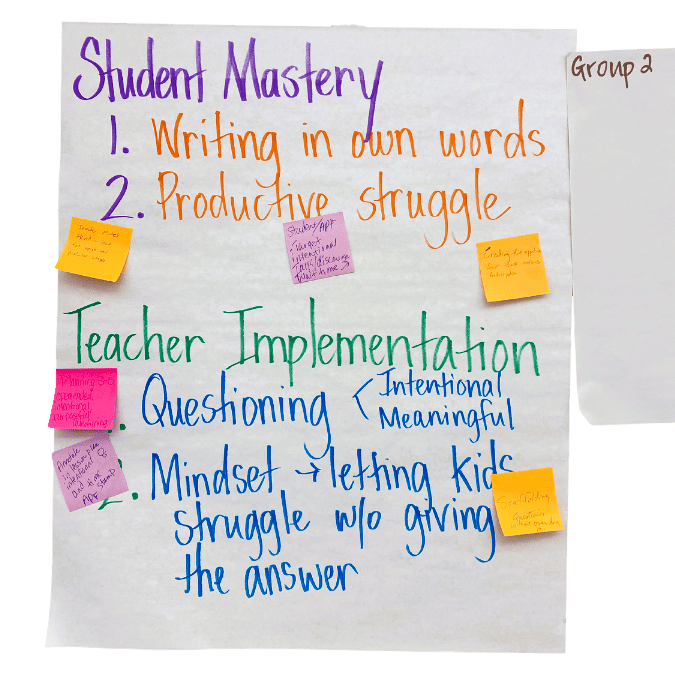
What is Academic Language in Math and Why Does it Matter?
12/13/2023

The Academic Language Gap
While supporting math educators in Baltimore City Public Schools with a new curriculum, the Leading Educators team and partners observed a concerning trend. Students could solve math problems correctly, but they struggled to express their ideas in writing.
Araceli Flores, Director of Math Content, explains,
We were working with teachers on unpacking misconceptions during lessons to deepen students’ understanding of math through a practice called error analysis. We would put a common error in front of students and have them tell us why the error was wrong as a way to reteach content. Students were able to complete the math to solve it correctly, but by and large, they were unable to express their ideas in written form.”

She says that if the prompt was to explain your reasoning, the team got responses like, “The answer is 90 minutes,” with no additional explanation. Sometimes, they prompted students with social questions like, “What do you think the impact of getting this incorrect would be?” Kids would write, “The person in the problem is wrong,” missing the greater relevance in the character’s life, such as getting undertipped, not having enough money for groceries, or the government misallocating the number of grocery stores in a food desert.
The whole point of these kinds of tasks is to get students talking about math in real and relevant ways. And the fact that students were engaging with the tasks and doing the math was great, but the writing had room for improvement.
Now, in the third year of partnership, Leading Educators is supporting math educators across 20 Baltimore City Public Schools campuses to address challenges like this with targeted and ongoing professional learning. This year, the focus is on sharpening academic language routines to enhance students’ math understanding.
Academic Language: A Cornerstone of Math Understanding
The team describes academic language as “the vocabulary and sentence structures needed to understand and convey mathematical concepts with precision.”
This is more than defining terms or simply getting students to talk about math more frequently. It also includes knowing the structure of a justification prompt, using different ways to explain solution strategies to others, and better organizing math ideas.
When used effectively, academic language routines:
- Equip students with tools to express mathematical ideas deeply.
- Elevate math vocabulary from an accessory to a crucial element.
- Foster skills like effective communication, self-advocacy, and critical thinking.
Why This Matters
State assessments often seek an understanding of concepts in word problems. However, curricula typically only scratch the surface of developing these skills. Araceli says,
The prevailing way that vocabulary is addressed in materials is by introducing a word with a pretty technical definition upfront and then giving kids an example. The teacher may use the word the rest of the lesson and all the subsequent lessons, but if you were to ask a kid what a ratio is, they could not tell you in their own words or pictures.”
In response to this learning gap, the City Schools partners did research on language acquisition strategies and learning science, especially around memory and retrieval. The aim was to design an ongoing professional learning sequence that takes teachers through a three-strategy arc to help kids internalize academic language and reshape how students engage with mathematical concepts within the Eureka Math curriculum.
Helping Teachers Improve
Clear models, planning time, and opportunities for feedback are needed for teachers to learn, practice, and implement academic language strategies. In Baltimore, teachers are learning to introduce, reinforce, and have students apply new vocabulary words to communicate their thinking.
- Introduce: Use representations and scenarios to introduce new vocabulary in context.
- Reinforce: Build off student working definitions by providing them with associated words they can integrate into a revised definition of the word.
- Apply: Have students apply words using sentence frames and templates.
“When kids learn how to write paragraphs in ELA, there’s a structure for supporting the main idea. They need to know how to do that for math as well,” Araceli explains. “We saw a clear connection to the work City Schools was already doing on academic language for multilingual learners, and a natural tagline emerged: ‘No student is a native speaker of mathematical language.’
Araceli noted further, “You are not taught at home how to communicate about Pythagoras’s theorem or the correlation between interior angles with a line cut by a transversal. You need to be actively taught that, and how vocabulary is currently approached in math curricula often goes against best practices that we know in language acquisition.”
Strengthening Teacher Support Structures
Despite structural challenges that are common to large districts, instructional coaches and school leaders are gaining the capacity to better support teachers with instructional growth.
With the support of Leading Educators, school and district leaders in City Schools lead turnkey curriculum-based professional learning (CBPL) aligned to the Eureka curriculum. The CBPL guides teachers to do shared learning, plan and practice academic language-based strategies, apply them to their lessons, and reflect on evidence.
 Alongside the PL, district instructional coaches receive one-on-one coaching to support teachers through this learning, lesson planning, and implementation. Additionally, the district receives support from LE through regular reflection on data and student work to plan and make adjustments.
Alongside the PL, district instructional coaches receive one-on-one coaching to support teachers through this learning, lesson planning, and implementation. Additionally, the district receives support from LE through regular reflection on data and student work to plan and make adjustments.
Teachers are learning strategies like introducing vocabulary through representations and scenarios so students can draw meaning from their observations rather than just defining words up front.
Ultimately, the goal is to help teachers practice what they teach and improve instructional rigor and differentiation in real time so all students can master challenging content that connects to their lives.
Reflect
As a school or system leader, you can also lead in key ways around efforts focused on deepening conceptual understanding of math. Consider:
- How can you better support teachers to develop strong content knowledge to use academic language effectively in mathematics?
- How are you assessing the impact of your math approach on long-term student outcomes, not just short-term indicators?
- How do your curriculum, standards, and assessments align to support teaching language as integral to math?
- What professional development is needed for principals and others to champion this approach?
- What schedule or policy changes could help instructional coaches prioritize this work?
Take Your Next Step
Excellence in math instruction is possible when we address math mindsets, cultivate student-led learning, and build buy-in from teachers and school leaders. For Baltimore City Public Schools, academic language is a missing piece of the mathematical puzzle, so focusing on it could be transformative for students and the field.
Are you looking to strengthen your math strategy and implementation? We can help. Learn more about partnership opportunities.








